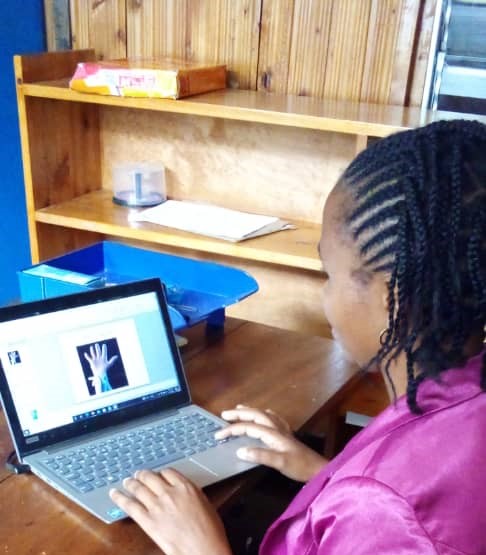Advancing Tanzania’s Infection Prevention and Control Capacity through e-Learning
The COVID-19 pandemic has demonstrated the importance of countries having strong and sustainable infection prevention and control (IPC) capacity to slow down the spread of infectious diseases. An assessment using WHO’s Joint External Evaluation tool (2.0) rated Tanzania’s capacity to respond to an epidemic as “developed but not sustainable.” The results indicated gaps in human resource skills in IPC at the national and sub-national levels, with weak monitoring, follow-up, feedback, and support systems for compliance with WHO’s IPC guidelines and standards.
Educators like Mary Ranald, a tutor at Kibosho School of Nursing, were using the old national IPC curriculum to teach pre-service health workers for five years. Crucial IPC topics, such as hand hygiene, health care waste management, personal protective equipment donning, and disinfection/sterilization of medical and surgical instruments, were missing from the curriculum.
But in 2018, the Tanzania Ministry of Health (MOH) partnered with the USAID Medicines, Technologies, and Pharmaceutical Services (MTaPS) Program to improve the country’s IPC capacity and advance it to the next level, developing a new curriculum incorporating the missing topics and aligned with WHO-recommended IPC guidelines.Informed by the new, more comprehensive curriculum, MTaPS collaborated with the Center for Distance Education (CDE) to develop an eight-module e-learning course for IPC.

Mary Ranald, tutor at Kibosho School of Nursing, accessing the course online. Photo Credit: MTaPS/Tanzania
MTaPS worked with the CDE to build its capacity to develop and manage the e-learning course, training its lecturers in course development, facilitation, and administration. The course, hosted on an MOH-run platform, has become part of the national curriculum. The MOH’s promotion of it to health care workers reflects the government’s ownership and institutionalization of the course for sustainability.
Converting the material into an e-learning format overcomes the cost and time constraints associated with in-person training, making the course more accessible for most pre-service and in-service health workers—even those in remote areas. Upon course completion, health care workers earn continuing professional development points that they can use when applying for re-licensure with professional bodies. Mary is one of more than 100 health workers who completed the course.
“I was happy to study the IPC course in e-learning [format] as I had never taken an online course before and it was not my intention to study it [IPC] anytime soon due to time and work priority constraints that would prevent me from physically traveling to take in-person training. It helped that this course is self-directed. It is fantastic! Because of the revised IPC guideline updates incorporated into the course, I will now be able to teach my students current IPC practices.”
—Mary Ranald, a tutor at Kibosho School of Nursing
WHO lists suboptimal IPC practices as a significant contributor to widespread disease transmission in health facilities, particularly during health emergencies. With a health workforce shortage in Tanzania, the free online course provides health workers like Mary an easily accessible and convenient mode of building IPC skills without having to take leave from their duty stations.
Improved IPC practices at health facilities also improve the quality of routine health care, reducing the risk of hospital-acquired infections that can jeopardize successful treatment. Fewer infections also mean less use of antibiotics, thereby helping improve antimicrobial stewardship—a key objective and goal of the Global Health Security Agenda, under which MTaPS provided support to the Tanzanian MOH.